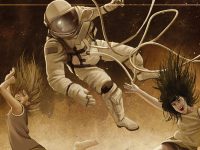
The sense we have of the world is build up with four dimensions, three of them are spatial and one is temporal. In effect, our brains perceive, through our sensorium, bodies of three dimensions that evolve over time. We can imagine worlds of less dimensions, but it is impossible for our brain to recreate worlds of more dimensions. It is the greatness of science: we can understand worlds without having to sense them. (The greatness of art is the opposite: it can sense worlds without having to understand them.) A line (one dimension) senses a point (zero dimensions) because it knows it is formed by a moving point. However, a point being (if it existed) would be unable to sense a line. A (two-dimensional) surface senses a (one-dimensional) line because it knows it is created by a moving line. However, an individual who moves in a linear world does not understand surfaces, he lacks the perspective for it. And a body of three dimensions senses any surface of two dimensions because it knows it was engendered by a moving surface. But an individual who moves in a world of two dimensions (like a worm) does not understand or senses anything when eaten by a bird that suddenly gets down from a three dimensional world.
Well, according to the modern and controversial superstring theory of theoretical physics, the reality of the world has ten dimensions and we live in an (if you will pardon the expression) underworld of only four dimensions. Our world is a sort of membrane in a world of many more dimensions or, as it is called in the jargon of the physicists of these topics, in a brane (brane: less than a membrane). Fortunately, the greatness of science is that we can understand without having the need to sense. Thanks to that we use and apply, for instance, quantum physics, which is not intuitive since there are no quantum observers. Our mind cannot feed from direct quantum experiences. For the same reason we can understand worlds of a higher order, but we cannot sense them. Well then, according to José Senovilla, full professor at the University of the Basque Country —one of the most original and brilliant current Spanish physicists— there is an interpretation of reality according to which time is decelerating, with the alarming prediction that it will end up stopping! That is, although it is undetectable for us, the seconds and minutes that strike the best watches are not all the same. Our great hypothesis about the nature of time is that it is uniform, since, otherwise, we would never know if the change we observe is due to the phenomena of reality or to the time with which we observe and measure such phenomena.
The model proposed by Senovilla and his team opens up the possibility that our world is a cut, a brane of a reality in which time stops and becomes space. In the general context of modern physics, this idea is well received because it solves pending problems and contradictions and it does not result so much in the creation of new ones. The situation is reminiscent of the one created in the early twentieth century with the mysterious ether, an omnipresent fluid that was invented to understand how electromagnetic waves are propagated in the vacuum. Michelson and Morley devoted their lives to searching for it without ever finding it… until Einstein arrived with his famous paper in 1905 and pulverised the answer by the simple procedure of changing the question. Ether was not necessary, and no one else ever talked about it again. Now, one of the more worrying mysteries is what and where is the mysterious dark energy of the cosmos. Its existence is today required to explain the observed accelerated expansion of the universe. With the new understanding dark energy is, as was ether, a redundant concept because it turns out that the cosmos is not accelerating its expansion, what happens is that time is slowing down. What now? What then? Time will slow down more and more until it fully stops. Time will die and disappear and the world will be frozen in a last snapshot.
Why not? After all, time started up with the Big Bang. If it could appear, it may well disappear?





